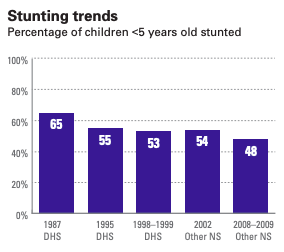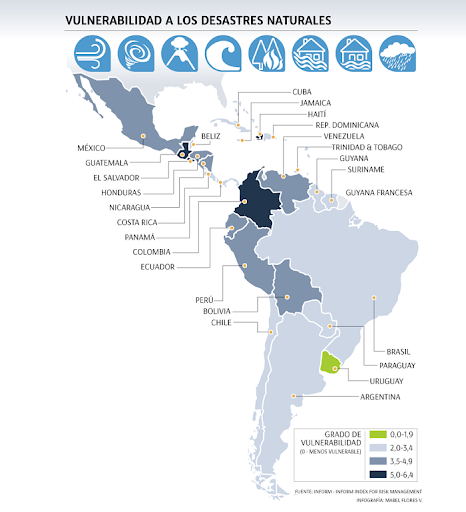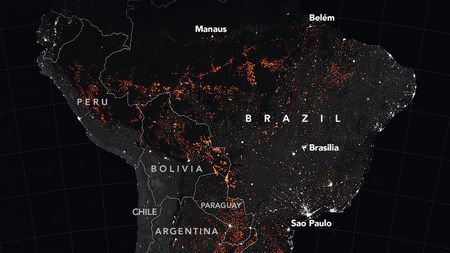Browse By Unit
1.3 Challenges Families Face in Spanish-Speaking Countries
4 min read•june 18, 2024
Victoria Sokol
Isabela Padilha
Victoria Sokol
Isabela Padilha
In some ways, we are all humans and face unique challenges based on our individual experiences. The following issues are just a few to consider as they affect sweeping groups of families. Consider how you can relate or empathize.
Socioeconomic and Environmental Challenges
Lack of Nutritious Food
Malnutrition and stunting are real problems for millions of people globally. In Latin America and the Caribbean, limited access to enough quality food for some mothers and children causes malnutrition.
"Almost 4 in 10 children under five in the region suffered from deficiencies in vitamins and minerals such as iron and iodine, further undermining their growth. Of the 18 countries in the region with data, Guatemala is the worst off with 1 in 2 children under 5 not growing well. —The State of the World’s Children 2019, UNICEF
Stunting is when someone doesn't develop properly. Generation after generation of malnutrition has caused some populations to experience higher rates of stunting. The bar graph below shows the stunting trends in Guatemala according to UNICEF.

Image from Unicef
Lack of Reliable Energy
Access to electricity varies greatly by country based on each individual country's dedication and investment in national infrastructure. The cost of energy in some areas is so high that it is unattainable by large portions of the population. Costa Rica, for example, has approximately 99% electricity coverage in the nation, while in Nicaragua has only approximately 68% coverage. The cost of gasoline in Venezuela is pennies per gallon while in other countries the cost of gasoline is above the national average in the United States. Without reliable energy, families struggle:
- to see inside their home to entertain themselves and grow interpersonal relationships.
- to access adequate healthcare because clinics are unable to complete safe sterilization.
- to access the internet and invaluable online information even though internet access has been declared a human right by the UN Human Rights Council.
Mistreatment
As part of the deeply rooted ideology of machismo and general tolerance to the underlying mistreatment, in some households, the strong male leader crosses the line of authoritarian to aggressor. Both women and children can receive mistreatment by their spouse/father.
14-38% of women in Latin America and the Caribbean have experienced intimate partner violence at least once in their lifetime. —United Nations, 2015
Recently, many countries in Latin America and the Caribbean have enacted laws committed to women's rights and protection from mistreatment and discrimination based on gender. Unfortunately, in many cases, it is only enforced on paper. A vast majority of reported cases of mistreatment are not investigated and aggressors go unpunished.
Lack of Quality Education
Education starts in the home. Lack of quality education perpetuates a cycle of oppression. Without advanced education, families are held back from economic advancement and being able to exit the cycle of oppression. When families barely have enough money for basic necessities like food and housing, paying for WIFI access is out of the question. In addition, in many countries, there is a fee to pay for schooling and necessary school books. By high school, many students drop out before finishing because they are working to help pay the bills or are exploited in child labor schemes instead of paying their required enrollment fees and staying in school.
In 2017, the number of Guatemalan adolescents enrolled in secondary school was 47.2 percent. —The Borgen Project
Recovering from Natural Disasters
The United States is one vast country, so many people never experience natural disasters. For much of Latin America, multiple natural disasters occur on a yearly basis. These disasters include earthquakes, hurricanes, landslides, floods, forest fires, and more.

Image from Infraestructura Pública.
Notable disasters in recent history:
- Earthquakes: The Peru-Chile Trench is part of the "Ring of Fire" and therefore a seismic zone. Both Central America and South America are affected by deadly earthquakes. The deadliest in recent history was a 7.8 magnitude quake in 1970 in Peru.
- Hurricanes: In recent history, Hurricane Maria of 2017 was a category 5 hurricane that caused widespread damage in Puerto Rico and is regarded as the most deadly disaster in the island's history.
- Landslides: Landslides are displaced earth commonly caused by heavy rainfall, earthquakes, and volcanic activity. These tend to be smaller, less deadly, but more common in causing regular disruption to daily family life.
- Floods: In 2010, over 1.5 million people were affected by widespread flooding in Colombia. The disaster was attributed to the natural phenomenon cycle of "El Niño/ La Niña."
- Forest Fires: The devastating 2019 forest fires that swept across the Amazon Rainforest burned over 900,000 hectares of forest.
Vocab in Spanish
| Earthquakes | Terremotos |
| Hurricanes | Huracanes |
| Landslides | Deslizamientos de tierra |
| Floods | Inundaciones |
| Forest Fires | Incendios forestales |

Image from Science Magazine
Impact of these challenges
It is impossible to separate Latin American issues from the phenomenon of immigration today. Due to factors such as economic hardship, violence and political insability, many latinx people have been driven out of their countries, creating a massive latinx diaspora in North America and Europe.
** Diaspora is a term that refers to communities and populations that have dispersed from their homeland and are in other places around the world. **
Latinx families have historically been a part of U.S culture, and it is important to recognize that. Even within Latin American countries, there is a flow of migration from the rural to the more urban areas. For example, in Mexico 🇲🇽, as the Northern part of the country has becomre more industriaized, several people from the South have moved to work on the maquiladoras across the US-Mexico border. This impacts the daily lives of families and their quality of life, since many of them are dispersed and have to deal with cultural challenges.
Key words: inmigración, diáspora, éxodo rural, maquiladoras.
<< Hide Menu
1.3 Challenges Families Face in Spanish-Speaking Countries
4 min read•june 18, 2024
Victoria Sokol
Isabela Padilha
Victoria Sokol
Isabela Padilha
In some ways, we are all humans and face unique challenges based on our individual experiences. The following issues are just a few to consider as they affect sweeping groups of families. Consider how you can relate or empathize.
Socioeconomic and Environmental Challenges
Lack of Nutritious Food
Malnutrition and stunting are real problems for millions of people globally. In Latin America and the Caribbean, limited access to enough quality food for some mothers and children causes malnutrition.
"Almost 4 in 10 children under five in the region suffered from deficiencies in vitamins and minerals such as iron and iodine, further undermining their growth. Of the 18 countries in the region with data, Guatemala is the worst off with 1 in 2 children under 5 not growing well. —The State of the World’s Children 2019, UNICEF
Stunting is when someone doesn't develop properly. Generation after generation of malnutrition has caused some populations to experience higher rates of stunting. The bar graph below shows the stunting trends in Guatemala according to UNICEF.

Image from Unicef
Lack of Reliable Energy
Access to electricity varies greatly by country based on each individual country's dedication and investment in national infrastructure. The cost of energy in some areas is so high that it is unattainable by large portions of the population. Costa Rica, for example, has approximately 99% electricity coverage in the nation, while in Nicaragua has only approximately 68% coverage. The cost of gasoline in Venezuela is pennies per gallon while in other countries the cost of gasoline is above the national average in the United States. Without reliable energy, families struggle:
- to see inside their home to entertain themselves and grow interpersonal relationships.
- to access adequate healthcare because clinics are unable to complete safe sterilization.
- to access the internet and invaluable online information even though internet access has been declared a human right by the UN Human Rights Council.
Mistreatment
As part of the deeply rooted ideology of machismo and general tolerance to the underlying mistreatment, in some households, the strong male leader crosses the line of authoritarian to aggressor. Both women and children can receive mistreatment by their spouse/father.
14-38% of women in Latin America and the Caribbean have experienced intimate partner violence at least once in their lifetime. —United Nations, 2015
Recently, many countries in Latin America and the Caribbean have enacted laws committed to women's rights and protection from mistreatment and discrimination based on gender. Unfortunately, in many cases, it is only enforced on paper. A vast majority of reported cases of mistreatment are not investigated and aggressors go unpunished.
Lack of Quality Education
Education starts in the home. Lack of quality education perpetuates a cycle of oppression. Without advanced education, families are held back from economic advancement and being able to exit the cycle of oppression. When families barely have enough money for basic necessities like food and housing, paying for WIFI access is out of the question. In addition, in many countries, there is a fee to pay for schooling and necessary school books. By high school, many students drop out before finishing because they are working to help pay the bills or are exploited in child labor schemes instead of paying their required enrollment fees and staying in school.
In 2017, the number of Guatemalan adolescents enrolled in secondary school was 47.2 percent. —The Borgen Project
Recovering from Natural Disasters
The United States is one vast country, so many people never experience natural disasters. For much of Latin America, multiple natural disasters occur on a yearly basis. These disasters include earthquakes, hurricanes, landslides, floods, forest fires, and more.

Image from Infraestructura Pública.
Notable disasters in recent history:
- Earthquakes: The Peru-Chile Trench is part of the "Ring of Fire" and therefore a seismic zone. Both Central America and South America are affected by deadly earthquakes. The deadliest in recent history was a 7.8 magnitude quake in 1970 in Peru.
- Hurricanes: In recent history, Hurricane Maria of 2017 was a category 5 hurricane that caused widespread damage in Puerto Rico and is regarded as the most deadly disaster in the island's history.
- Landslides: Landslides are displaced earth commonly caused by heavy rainfall, earthquakes, and volcanic activity. These tend to be smaller, less deadly, but more common in causing regular disruption to daily family life.
- Floods: In 2010, over 1.5 million people were affected by widespread flooding in Colombia. The disaster was attributed to the natural phenomenon cycle of "El Niño/ La Niña."
- Forest Fires: The devastating 2019 forest fires that swept across the Amazon Rainforest burned over 900,000 hectares of forest.
Vocab in Spanish
| Earthquakes | Terremotos |
| Hurricanes | Huracanes |
| Landslides | Deslizamientos de tierra |
| Floods | Inundaciones |
| Forest Fires | Incendios forestales |

Image from Science Magazine
Impact of these challenges
It is impossible to separate Latin American issues from the phenomenon of immigration today. Due to factors such as economic hardship, violence and political insability, many latinx people have been driven out of their countries, creating a massive latinx diaspora in North America and Europe.
** Diaspora is a term that refers to communities and populations that have dispersed from their homeland and are in other places around the world. **
Latinx families have historically been a part of U.S culture, and it is important to recognize that. Even within Latin American countries, there is a flow of migration from the rural to the more urban areas. For example, in Mexico 🇲🇽, as the Northern part of the country has becomre more industriaized, several people from the South have moved to work on the maquiladoras across the US-Mexico border. This impacts the daily lives of families and their quality of life, since many of them are dispersed and have to deal with cultural challenges.
Key words: inmigración, diáspora, éxodo rural, maquiladoras.

© 2024 Fiveable Inc. All rights reserved.